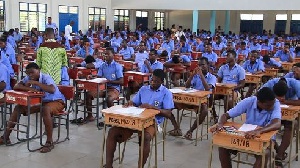 Restrictions have been eased to allow final year students back in schools
Restrictions have been eased to allow final year students back in schools
Governments and major stakeholders in education the world over are confronted with challenges in how to end the academic year during this stressing time of coronavirus pandemic.
Since March, many countries have had school closures. Some have embarked on online or distance learning till now.
In the United Kingdom, some primary schools have reopened for some children to complete the school year - with Wales announcing a return for all ages of pupils at the end of June.
However, the exact rules governing the running of schools vary, but headteachers have been working out how best to minimise risks for pupils, staff and parents.
The Ministry of Education in Ghana is opening its school premises to only final year students to complete the school year with the following plan:

As the academic year gradually comes to an end, the evaluation of student work is not business as usual.
In Ontario:
The Ministry of Education in Ontario-Canada has released key considerations for Term 2 Report Card/Kindergarten Communication of Learning. The guidelines seek to “provide some flexibility, adapt to current school closures and provide greater consistency for all school boards in the province.”
The guidelines among others rely heavily on the teacher’s professional judgement as found in the guidelines I quote below:
- marks/ratings/observations cannot go down after March 13. Teachers can use their professional judgement to decide whether to include evidence of learning during the school closure if it benefits individual students;
- when there is insufficient evidence of learning in a particular subject or strand (including math strands), teachers will use their professional judgement to determine if the code “I” is appropriate and a generic comment is provided can be used (Grades 1-8);
- teachers will use their professional judgement to make decisions regarding whether to include comments on growth in learning demonstrated during the school closure when it benefits the child.
The Union of public school teachers in Ontario, EFTO is of the stand that ‘the use of Professional Judgement is embedded throughout the Ministry assessment document.’ The Union is, therefore, encouraging its members to use their professional judgement for the following:
* determine grades/ratings;
* the inclusion of assessment information gathered during school closure when it is in the best interest of individual student;
* the limited use of “I” when insufficient evidence is available or a subject/strand was not addressed and the generic statement provided;
* the depth and breadth of comments included Kindergarten on learning and growth;
* the depth and breadth of comments in Grades 1 to 8 (e.g., what students have learned and where possible, describe significant strengths and identify next steps); and
* the use of the generic comments provided by the Ministry for various situations including to indicate that a student engaged/did not engage during the school closure.
It, therefore, becomes obvious that because of the Covid-19 pandemic, established practices for evaluation of student work and the determination of grades, ratings and comments cannot be completely relied upon. Thus, parents will not be reading Report Cards from their children schools the usual and familiar Report Cards!
Undeniably, the global impact of Coronavirus is immense as educational institutes all over the world are closed. Covid-19 has thrown education all over the world in a loop. There have been efforts and innovations to overcome such problems. Virtual/google classrooms and, virtual graduation ceremonies for final year students have been organized by many schools/colleges/universities. However, ending the academic year and evaluating student work during the coronavirus pandemic is not business as usual.